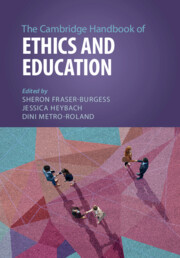Book contents
- The Cambridge Handbook of Ethics and Education
- The Cambridge Handbook of Ethics and Education
- Copyright page
- Epigraph
- Contents
- Figures
- Tables
- Contributors
- Foreword
- Preface
- Acknowledgments
- Part I Traditions in Ethics and Education
- Part II Ethics and Education in Practice
- Part III Emerging Ethical Pathways and Frameworks
- 28 Defining Moral Responsibility for School Leaders in Times of Democratic Crisis
- 29 Convivialism, Interdependence, and Education
- 30 New Existentialism
- 31 Antiracist Moral and Civic Education
- 32 A Decolonial Feminist Perspective
- 33 Ethics and Mindful Leadership in Education
- 34 Ethics as a Field Discipline in the Classroom
- 35 Centering an Environmental Ethic in Climate Crisis
- 36 Ethical Inquiry in Educational Research
- 37 Education and the Technological Horizon
- 38 Teaching in Credal Deep Pluralism
- 39 A Pragmatic Approach to Ethics in Education
- 40 Spectatorship, Black Bodies, and Urban Education
- Index
- References
29 - Convivialism, Interdependence, and Education
New Conceptions of Human and Planetary Flourishing
from Part III - Emerging Ethical Pathways and Frameworks
Published online by Cambridge University Press: 07 March 2024
- The Cambridge Handbook of Ethics and Education
- The Cambridge Handbook of Ethics and Education
- Copyright page
- Epigraph
- Contents
- Figures
- Tables
- Contributors
- Foreword
- Preface
- Acknowledgments
- Part I Traditions in Ethics and Education
- Part II Ethics and Education in Practice
- Part III Emerging Ethical Pathways and Frameworks
- 28 Defining Moral Responsibility for School Leaders in Times of Democratic Crisis
- 29 Convivialism, Interdependence, and Education
- 30 New Existentialism
- 31 Antiracist Moral and Civic Education
- 32 A Decolonial Feminist Perspective
- 33 Ethics and Mindful Leadership in Education
- 34 Ethics as a Field Discipline in the Classroom
- 35 Centering an Environmental Ethic in Climate Crisis
- 36 Ethical Inquiry in Educational Research
- 37 Education and the Technological Horizon
- 38 Teaching in Credal Deep Pluralism
- 39 A Pragmatic Approach to Ethics in Education
- 40 Spectatorship, Black Bodies, and Urban Education
- Index
- References
Summary
This chapter presents convivialism as a conception of the good life to inform and reshape education. Drawing from Ivan Illich’s views of a convivial society and two more recent manifestos proposing convivialism as a political philosophy for a world in crisis, the chapter discusses how convivialism offers a conception of the good life focused on living with human and nonhuman others. Convivial education relies on a conception of knowledge and skills as tools for conviviality, as well as an appreciation for the necessity to limit what can be considered legitimate individual and collective desires. Finally, the chapter argues that convivialism can inspire new educational initiatives and support existing countermovements based on principles of degrowth and decolonization.
- Type
- Chapter
- Information
- The Cambridge Handbook of Ethics and Education , pp. 619 - 637Publisher: Cambridge University PressPrint publication year: 2024



